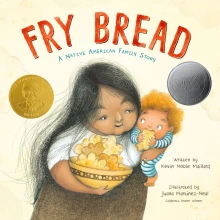
Fry Bread: A Native American Family Story
Written by Kevin Noble Maillard
Illustrated by Juana Martinez-Neal
Roaring Book Press, 2019, 40 pp (unpaged)
ISBN: 978-1626727465
The title says it all: making and eating fry bread is ultimately about family, both local and extended. Fry Bread is a lyrical poem that celebrates what making and eating fry bread does for members of an Indigenous community. Each stanza is part of a double-page spread and starts with an echo-like statement about the bread:
Fry bread is food
Fry bread is shape
Fry bread is sound
Fry bread is color
Fry bread is flavor
Fry bread is time
Fry bread is art
Fry bread is history
Fry bread is place
Fry bread is nation
Fry bread is everything
Fry bread is us
Fry bread is you
Each statement is followed by rich descriptors that make reading the poem a sensory and evocative experience. It ties creating and eating fry bread to a Seminole family, but then the notion of family ripples out in widening circles, embracing the diversity that is represented in Indegnous traditions around fry bread: how it is made, who makes it, and the history behind it. It is a book that becomes richer each time it is read!
The extensive back matter turns the poem into an information book. It begins with the author's own Seminole family recipe for fry bread, then he amplifies each statement with notes, explaining the diversity inherent in each characteristic. For example, in "fry bread is shape," he explains how different families shape the fry bread by dropping it in hot fat by spoonfuls, or by rolling it out into flat round shapes before frying it. The stanzas celebrate the diversity in the way fry bread is created (e.g., ingredients), and how it is eaten (with beans, soup, sugar, honey). After the first five stanzas about the fry bread itself, Kevin Maillard expands the discussion by addressing when it is eaten (on regular days or special days), and who in a family passes on traditions. He also explains how fry bread was born out of adversity when Indigenous tribes were forced to vacate their traditional lands and ways of life. Ancestors had to adapt to new agricultural practices and plants in addition to using government food rations. So cooks were creative, using what was available to them to feed their families. Ultimately, this poem is about diversity: the how, why, when fry bread is created and eaten with family across North American Indigenous tribes and (listed on the end pages). Whether fry bread is made with corn or wheat flour, fried in lard or coconut oil, rolled out or dropped in the fat by spoonfuls, everyone has a traditional way of making fry bread that is steeped in practices passed down from generation to generation.
The illustrations are rendered in acrylics, colored pencils, and graphite on textured paper with Juana Martinez Neal's signature curvy shapes. Big-eyed enthusiastic children watch as grandparents and parents mix and shape the dough, fry it and serve it to a hungry family group. Significantly, Martinez-Neal added in colors and patterns that represent the Seminole heritage of author Kevin Maillard. The illustrations also depict the diversity in skin tones of Seminole peoples who enjoy making and eating fry bread.
The book has won many awards: the 2020 Robert F. Sibert Award, an honor book by the American Indian Youth Literature Award, a Charlotte Zolotow honor book and a Charlotte Huck recommended book.
There are many outstanding titles that would pair well with this book (e.g., books profiling cultural foods), but the titles that follow emphasize the way food creates community. Grace Lin (1999) wrote and illustrated The Ugly Vegetables based on her own childhood, recording the discontent she felt as her mother's garden patch looked very different from the neighbors. Only after they harvested and cooked the Chinese vegetables into an aromatic soup that drew their neighbors to the door, does Grace realize how special it is to enjoy and share diverse foods and plants. In a similar story, Oga Mora (2018) tells the story in Thank You, Omu! of a grandmother cooking and sharing her pot of West African soup with all the neighbors in her apartment building after the delicious odors circulate in the hallways! Finally, Ilima Loomis and Kenard Pak (2022) use a cumulative poem in 'Ohana Means Family to describe an Hawaiian family growing Kalo plants on their land that they will use to make poi for the luau at which they are joined by their ohana, i.e., their extended family and friends. Similar to Fry Bread, the book illustrates and discusses the way kalo is part of Native Hawaiian history and references the wind that carries the stories from generation to generation.
Kevin Noble Maillard is an enrolled member of the Seminole Nation of Oklahoma. He is also a professor of law at Fordham University in New York City, and writes for the New York Times and The Atlantic on a wide variety of topics including issues of race, laws, and food! Fry Bread is his first title for children. More information about him can be found on his website.
Juana Martinez Neal is a Peruvian-born author/illustrator currently living in Connecticut! She has written and/or illustrated many award-winning titles including Alma and How She Got Her Name (2018), winner of a Caldecott honor, and La Princesa and the Pea, written by Susan Middleton Elya (2017) and winner of the Pura Belpré award. More information can be found on her website.
Susan Corapi, Trinity International University
© 2023 by Susan Corapi
Authors retain copyright over the vignettes published in this journal and grant the journal right of first publication with the work simultaneously licensed under the following Creative Commons License:
WOW Review, Volume XV, Issue 4 by Worlds of Words is licensed under a Creative Commons Attribution-NonCommercial-ShareAlike 4.0 International License. Based on work by Susan Corapi at https://wowlit.org/on-line-publications/review/xv-4/4.
WOW review: reading across cultures
ISSN 2577-0527








